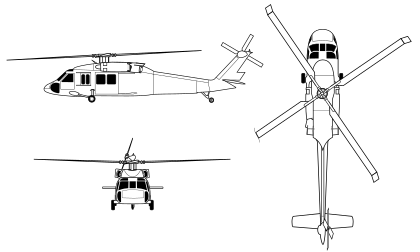UH 60 Technical Specifications and Performance Evaluation
UH 60 Technical Specifications and Performance Evaluation
Blog Article
The Effect of Lasting Practices on the Future of Aircraft Procedures and Emissions Reduction
As the air travel market faces raising analysis over its ecological impact, the adoption of sustainable practices emerges as an essential path toward future aircraft operations and exhausts reduction. Developments in lasting air travel fuels and improvements in crossbreed propulsion modern technologies stand at the center of this improvement, encouraging significant reductions in greenhouse gas exhausts.

Overview of Sustainable Practices
Sustainable methods in airplane procedures incorporate a variety of approaches focused on lowering ecological influence while maintaining operational efficiency. These practices are crucial in the aviation sector's dedication to minimizing its carbon impact and adhering to worldwide environmental criteria. Key efforts include enhancing flight paths to reduce fuel usage, boosting upkeep methods to ensure aircraft run at peak effectiveness, and carrying out innovative modern technologies such as winglets and lightweight products that enhance the rules of aerodynamics.

Educating and engaging staff on sustainability techniques also play an essential role, fostering a society of environmental obligation within organizations. In general, the integration of these lasting practices not only helps decrease exhausts however likewise enhances the lasting stability of the aeronautics field, ensuring it fulfills the demands of both customers and regulatory bodies while adding to global sustainability goals.
Cutting-edge Gas Alternatives
Numerous innovative gas choices are becoming essential services to reduce the aeronautics industry's dependence on typical nonrenewable fuel sources. Among these alternatives, Lasting Aeronautics Fuels (SAFs) have actually gained significant attention as a result of their prospective to lower lifecycle greenhouse gas exhausts by approximately 80% compared to traditional jet fuels. SAFs are originated from various feedstocks, including waste oils, agricultural deposits, and even algae, making them a versatile option for the market.
An additional encouraging alternative is hydrogen fuel, which, when utilized in fuel cells, creates just water vapor as a result. In addition, electric propulsion systems are being explored, leveraging battery modern technology to power airplane.
Finally, biofuels stemmed from biomass are being explored, offering an eco-friendly option that can be mixed with standard gas. Jointly, these cutting-edge fuel alternatives stand for a vital action toward accomplishing a lasting aeronautics environment, straightening with global exhausts reduction targets and boosting the sector's ecological stewardship.
Technical Developments in Air Travel

Just how can technological innovations improve the future of aeronautics? The integration of advanced innovations is critical in transforming aircraft procedures, improving efficiency, and minimizing discharges. Innovations such as electric and hybrid propulsion systems are at the center, promising considerable reductions in fuel consumption and greenhouse gas exhausts. These systems utilize advancements in battery modern technology and power administration, enabling airplane to run with a lower environmental impact.
Furthermore, the execution of innovative products, such as light-weight composites, contributes to enhanced aerodynamics and fuel efficiency. The usage of artificial knowledge and artificial intelligence in trip procedures optimizes course planning and lowers gas shed by making it possible for real-time changes based on weather and web traffic problems. In addition, the development of self-governing and remotely piloted aircraft systems stands to revolutionize cargo and traveler transportation, potentially boosting performance while reducing human error.
Additionally, sustainable air travel technologies, including innovative air website traffic administration systems, can enhance operations and lower blockage, resulting in lower emissions during flight. These developments jointly stand for a paradigm shift in aviation, promising a future where sustainability and operational performance are intertwined, thereby sustaining the industry's commitment to reducing its ecological effect.

Regulative Framework and Conformity
In light of the expanding focus on environmental stewardship within the aviation industry, the regulatory framework governing airplane operations is progressing to advertise lasting techniques. Regulative bodies, such as the International Civil Aviation Organization (ICAO) and various nationwide aeronautics authorities, are introducing rigorous standards aimed at reducing emissions and boosting functional effectiveness.
These laws commonly consist of the fostering of Sustainable Air travel Gas (SAF), which has been acknowledged as a vital part in achieving reduced carbon footprints. Compliance with these laws needs airlines to apply advanced modern technologies and operational methods, such as optimized trip paths and improved air web traffic administration, to reduce fuel usage.
In addition, the enforcement of exhausts trading schemes and carbon offsetting campaigns is becoming increasingly common, engaging airlines to keep an eye on and report their discharges precisely. Non-compliance can cause significant fines, hence pressing drivers to prioritize sustainability in their company models.
Ultimately, the developing governing landscape not only drives advancement and investment in environment-friendly modern technologies but also promotes a society of liability within the aviation industry. As these structures continue to establish, the concentrate on sustainable practices will certainly be indispensable to achieving the field's long-lasting ecological objectives.
Future Fads in Airplane Operations
As the air travel market adapts to a significantly like this strict governing setting, future patterns in aircraft operations are readied to concentrate on ingenious options that further enhance sustainability and effectiveness - uh 60. Key advancements will likely include the adoption of advanced air website traffic monitoring systems, which use real-time data and man-made intelligence to optimize trip courses, reducing fuel consumption and discharges
An additional substantial pattern is the boosted integration of sustainable aviation gas (SAFs) These choices to traditional jet fuel, stemmed from eco-friendly resources, can significantly decrease lifecycle greenhouse gas emissions. The industry's dedication to SAFs will likely increase as airline companies work together with fuel producers to ensure schedule and cost-effectiveness.
Furthermore, the push towards electrification and crossbreed propulsion systems is gaining momentum. Arising airplane styles will certainly include these innovations, offering quieter and a lot more effective procedures, specifically for short-haul flights.
Verdict
The fostering of sustainable aviation fuels, coupled with developments in check out this site hybrid and electrical propulsion systems, is crucial for minimizing lifecycle greenhouse gas discharges. Maximizing trip paths and accepting ingenious innovations contribute to a quieter and a lot more environmentally pleasant air travel field.
Innovations in lasting aviation gas and developments in hybrid propulsion innovations stand at the center of this change, promising considerable decreases in greenhouse gas exhausts.Countless ingenious fuel alternatives are arising as essential remedies to minimize the aviation sector's reliance on traditional fossil fuels - uh 60. Among these options, Sustainable Aeronautics Fuels (SAFs) have actually gotten considerable interest due to their prospective to lower lifecycle greenhouse gas exhausts by up to 80% contrasted to conventional jet gas.Another considerable fad is the boosted combination of lasting aeronautics fuels (SAFs) recommended you read The fostering of sustainable air travel fuels, paired with developments in hybrid and electrical propulsion systems, is crucial for lessening lifecycle greenhouse gas emissions
Report this page